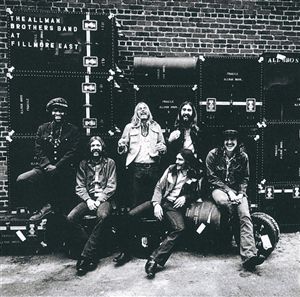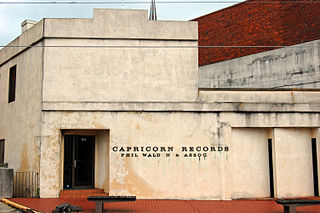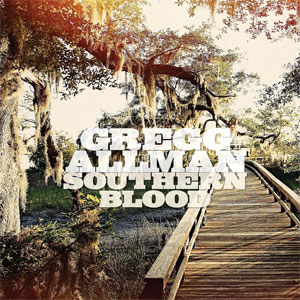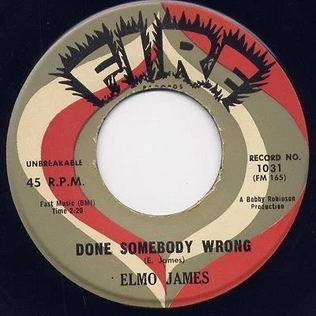
The Allman Brothers Band was an American rock band formed in Jacksonville, Florida, in 1969. Its founding members were brothers Duane Allman and Gregg Allman, as well as Dickey Betts, Berry Oakley (bass), Butch Trucks (drums), and Jai Johanny "Jaimoe" Johanson (drums). Subsequently based in Macon, Georgia, they incorporated elements of blues, jazz and country music and their live shows featured jam band-style improvisation and instrumentals.

At Fillmore East is the first live album by American rock band the Allman Brothers Band, and their third release overall. Produced by Tom Dowd, the album was released on July 6, 1971 in the United States, by Capricorn Records. As the title indicates, the recording took place at the New York City music venue Fillmore East, which was run by concert promoter Bill Graham. It was recorded over the course of three nights in March 1971 and features the band performing extended jam versions of songs such as "Whipping Post", "You Don't Love Me" and "In Memory of Elizabeth Reed". When first commercially released, it was issued as a double LP with just seven songs across four vinyl sides.

Eat a Peach is the third studio album and the first double album by American rock band the Allman Brothers Band. Produced by Tom Dowd, the album was released on February 12, 1972, in the United States by Capricorn Records. It was the band's fourth album since their debut The Allman Brothers Band in 1969; released as a double album, it constitutes both their third studio album and second live album, containing a mix of live and studio recordings released in 1972. Following their artistic and commercial breakthrough with the July 1971 release of the live album At Fillmore East, the Allman Brothers Band got to work on their third studio album. Drug use among the band became an increasing problem, and at least one member underwent rehab for heroin addiction. On October 29, 1971, lead and slide guitarist Duane Allman, group leader and founder, was killed in a motorcycle accident in the band's adopted hometown of Macon, Georgia, making it the final album to feature him.

Howard Duane Allman was an American rock and blues guitarist and the founder and original leader of the Allman Brothers Band, for which he was posthumously inducted into the Rock and Roll Hall of Fame in 1995.

Capricorn Records was an independent record label founded by Phil Walden and Frank Fenter in 1969 in Macon, Georgia. Capricorn Records is often credited by music historians as creating the southern rock genre.

The Allman Brothers Band is the debut studio album by American rock band the Allman Brothers Band. Produced by Adrian Barber, it was released in the United States on November 4, 1969, by Atco Records subsidiary Capricorn. Formed in 1969, the Allman Brothers Band came together following various musical pursuits by each individual member. Guitarist and bandleader Duane Allman moved to Jacksonville, Florida where he led large jam sessions with his new band, one he had envisioned as having two guitarists and two drummers. After rounding out the lineup with the addition of his brother, Gregg Allman, the band moved to Macon, Georgia, where they were to be one of the premiere acts on Capricorn.

Idlewild South is the second studio album by American rock band the Allman Brothers Band. With the exception of one song, the album was produced by Tom Dowd and was released on September 23, 1970 in the United States, by Atco Records and Capricorn Records. Following the release of their 1969 debut, the Allman Brothers Band toured the United States extensively to promote the album, which had little commercial success. Their performances, however, did create positive word of mouth exposure that extended to more famous musicians, such as Eric Clapton, who invited group leader Duane Allman to contribute to his 1970 album Layla and Other Assorted Love Songs.

Brothers and Sisters is the fourth studio album by American rock band The Allman Brothers Band. Co-produced by Johnny Sandlin and the band, the album was released in August 1973 in the United States, by Capricorn Records. Following the death of group leader Duane Allman in 1971, the Allman Brothers Band released Eat a Peach (1972), a hybrid studio/live album that became their biggest-selling album to date. Afterwards, the group purchased a farm in Juliette, Georgia, to become a "group hangout". However, bassist Berry Oakley was visibly suffering from the death of Duane, excessively drinking and consuming drugs. In November 1972, after nearly a year of severe depression, Oakley was killed in a motorcycle accident, making it the last album on which he played.

"Jessica" is an instrumental piece by American rock band the Allman Brothers Band, released in December 1973 as the second single from the group's fourth studio album, Brothers and Sisters (1973). Written by guitarist Dickey Betts, the song is a tribute to gypsy jazz guitarist Django Reinhardt, in that it was designed to be played using only two fingers on the left hand.
"In Memory of Elizabeth Reed" is an instrumental composition by the American group The Allman Brothers Band. It first appeared on their second studio album, Idlewild South (1970), released on Capricorn Records. The jazz-influenced piece was written by guitarist Dickey Betts, among his first writing credits for the group. Betts named it after a headstone he saw for Elizabeth Jones Reed Napier in Rose Hill Cemetery in the band's hometown of Macon, Georgia. Multiple versions of the composition have been recorded, with the version performed on the group's 1971 live album At Fillmore East generally considered the definitive rendition.
"Blue Sky" is a song by the American rock band The Allman Brothers Band from their third studio album, Eat a Peach (1972), released on Capricorn Records. The song was written and sung by guitarist Dickey Betts, who penned it about his girlfriend, Sandy "Bluesky" Wabegijig. The track is also notable as one of guitarist Duane Allman's final recorded performances with the group. The band's two guitarists, Duane Allman and Dickey Betts, alternate playing the song's lead: Allman's solo beginning 1:07 in, Betts joining in a shared melody line at 2:28, followed by Betts's solo at 2:37. The song is notably more country-inspired than many songs in the band's catalogue.

"Midnight Rider" is a song by the American rock band the Allman Brothers Band. It was the second single from their second studio album, Idlewild South (1970), released on Capricorn Records. The song was primarily written by vocalist Gregg Allman, who first began composing it at a rented cabin outside Macon, Georgia. He enlisted the help of roadie Robert Kim Payne to complete the song's lyrics. He and Payne broke into Capricorn Sound Studios to complete a demo of the song.

Laid Back is the debut solo studio album by American singer-songwriter Gregg Allman, released in October 1973 by Capricorn Records. Allman, best known as the vocalist/lyricist/organist of the Allman Brothers Band, first began considering a solo career after internal disagreements with that group. He developed the album as a small creative outlet wherein he would assume full control, and he co-produced the album alongside Johnny Sandlin. Laid Back was largely recorded in March 1973 at Capricorn Sound Studios in Macon, Georgia, with additional recording and mixing taking place at the Record Plant by Manhattan Recording Engineer, Jim Reeves in New York City.

The Gregg Allman Tour is the first live album by Gregg Allman, released in 1974. It was recorded at Carnegie Hall and Capitol Theatre. It peaked at number 50 on the Billboard Pop Albums charts in 1974. It was originally released as a double LP.

Tommy Talton was an American guitarist who was a member of the rock groups Cowboy and We the People. He was also noted for playing and recording with Gregg Allman, Paul Butterfield, the Allman Brothers Band, Bonnie Bramlett, Clarence Carter, Corky Laing, Billy Joe Shaver, Dickey Betts, Kitty Wells, Martin Mull and Johnny Rivers.

Southern Blood is the eighth and final studio album by American singer-songwriter Gregg Allman, released on September 8, 2017 by Rounder Records, four months after Allman's death. Following the release of his seventh album, Low Country Blues (2011), Allman continued to tour and released a memoir, My Cross to Bear, in 2012. However, that same year, he was diagnosed with liver cancer. His output and schedule in the intervening years gradually slowed, and Southern Blood, recorded in March 2016, became his final album. He and his backing band recorded the album with producer Don Was at FAME Studios in Muscle Shoals, Alabama over a period of nine days.

Cowboy was an American country rock and southern rock band formed in Jacksonville, Florida, in 1969. The group's main members consisted of songwriters Tommy Talton and Scott Boyer, alongside a rotating group of musicians. They released four albums on the Capricorn Records label in the 1970s: Reach for the Sky (1970), 5'll Getcha Ten (1971), Boyer and Talton (1974), and Cowboy (1977). The song "Please Be with Me"–perhaps their best-known song–featured a performance from Duane Allman. It was also later covered by Eric Clapton on his album 461 Ocean Boulevard (1974).
Charles Scott Boyer II was an American singer-songwriter and guitarist. Boyer was best known for co-founding the band Cowboy. Boyer was born in Chenango, New York, and moved to Jacksonville, Florida in his youth.

"I Must Have Done Somebody Wrong" is a blues song written and recorded by Eddie Kirkland in 1959. Using the same lyrics but modifying aspects of the music, Elmore James recorded it as "Done Somebody Wrong" in 1960; he took sole writing credit for it and it came to be known as an Elmore James song. "Done Somebody Wrong" was interpreted by the Allman Brothers Band in 1971 and featured on their classic live album At Fillmore East. As Billboard magazine has stated, the song became "more associated with the Allmans than with James in the end."
Scott Schinder was an American music critic and journalist from Long Island, New York.















